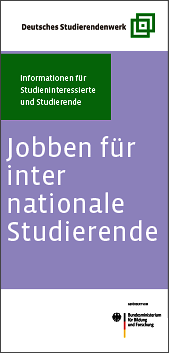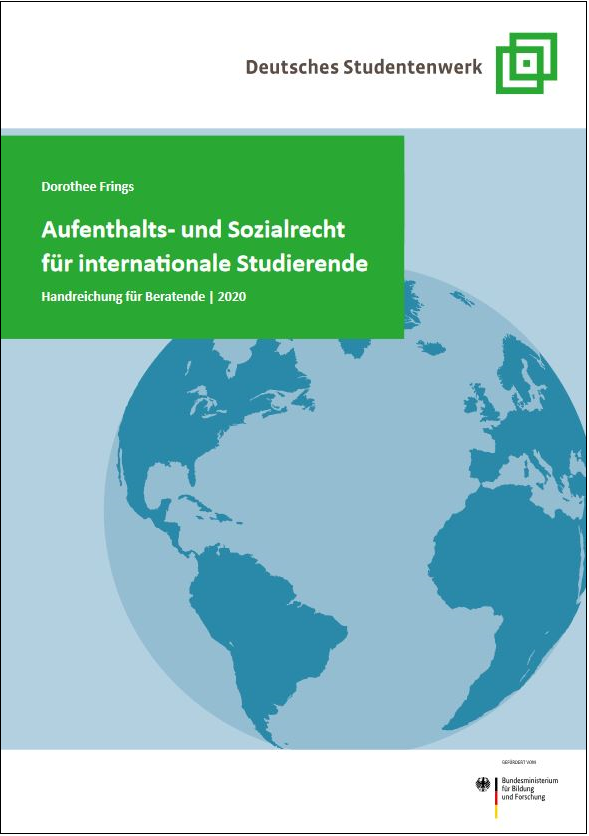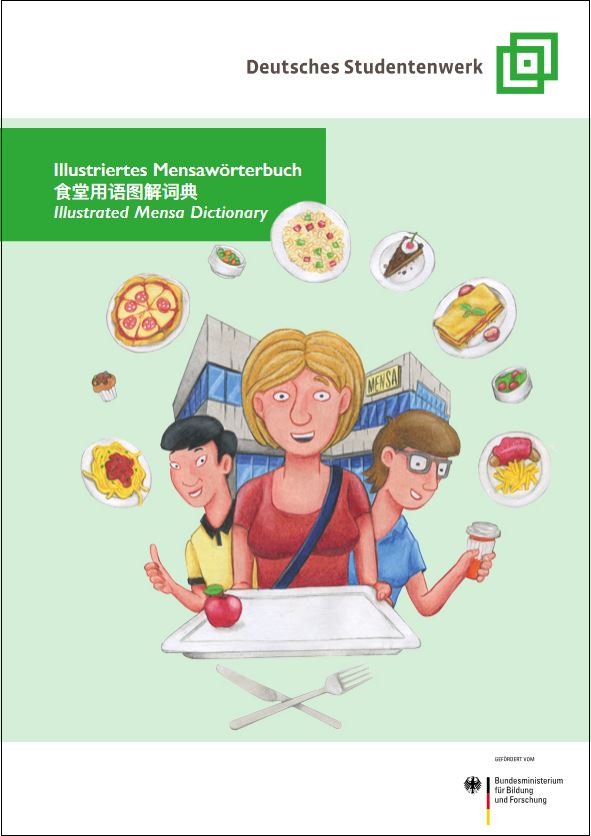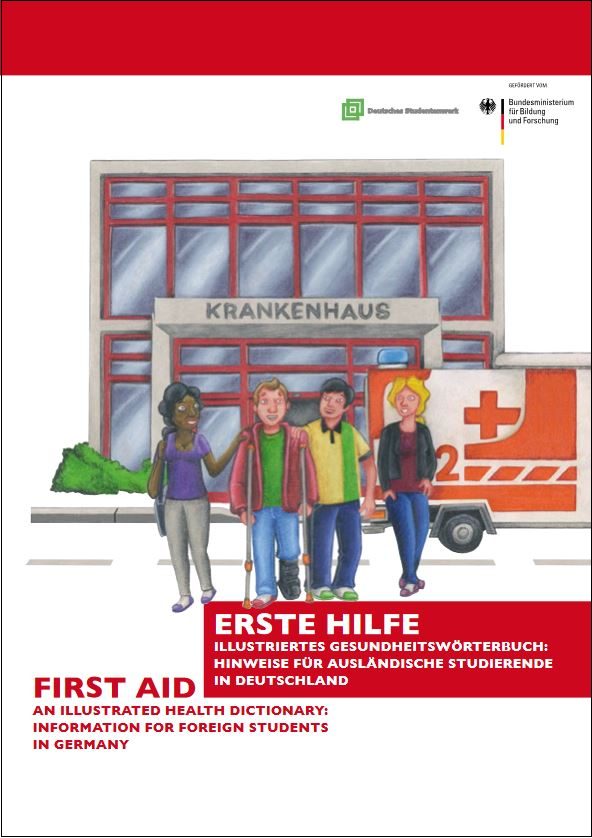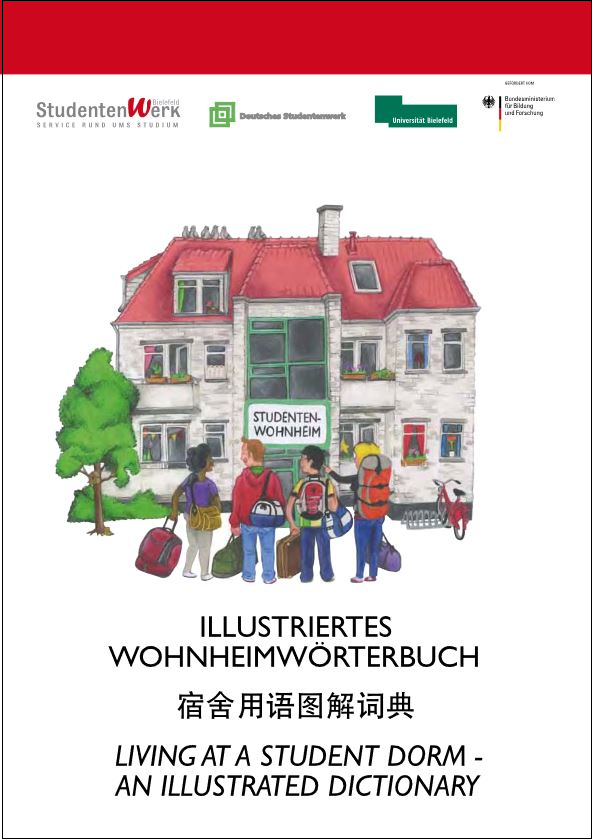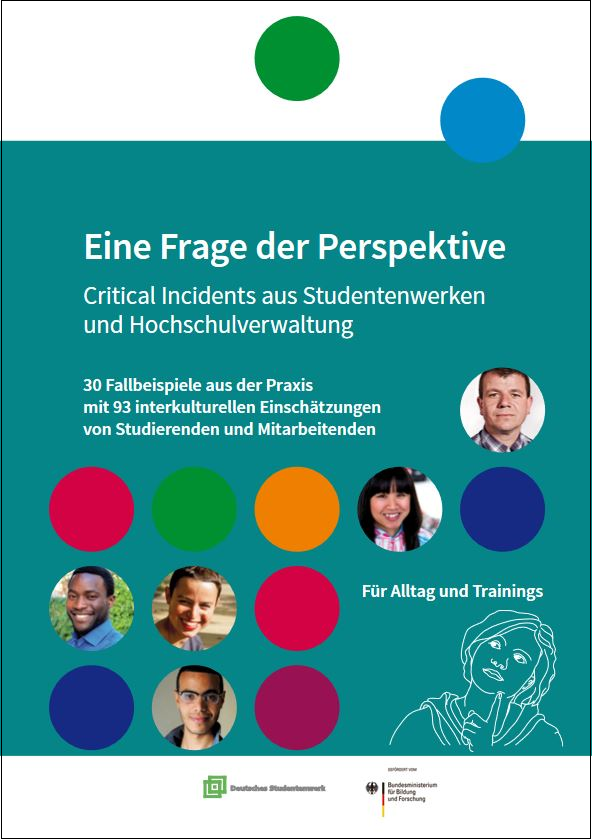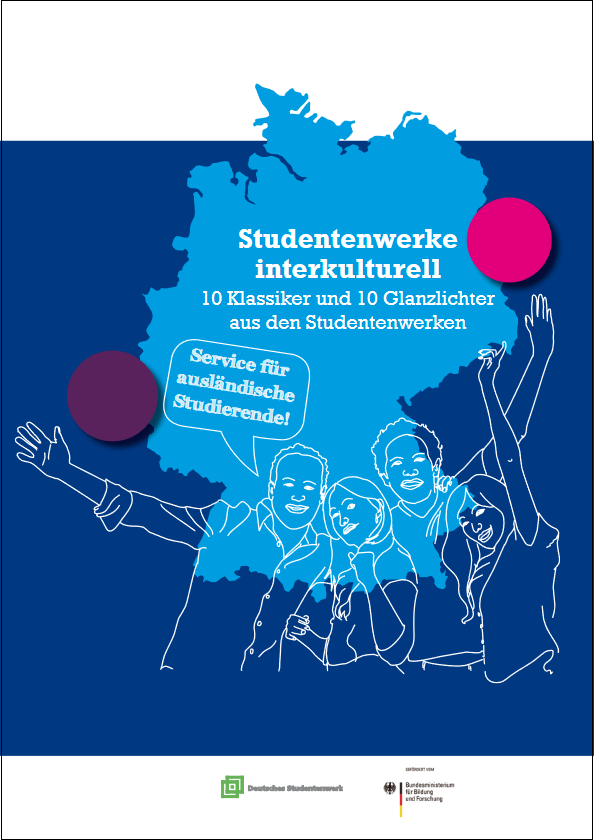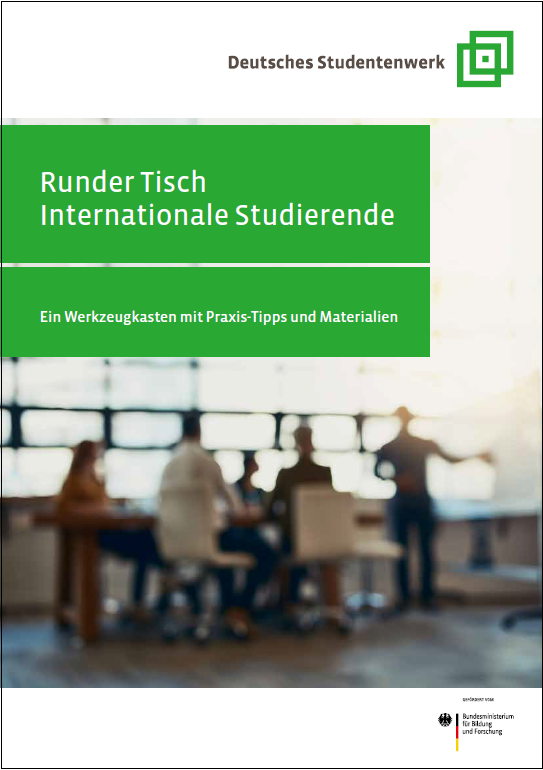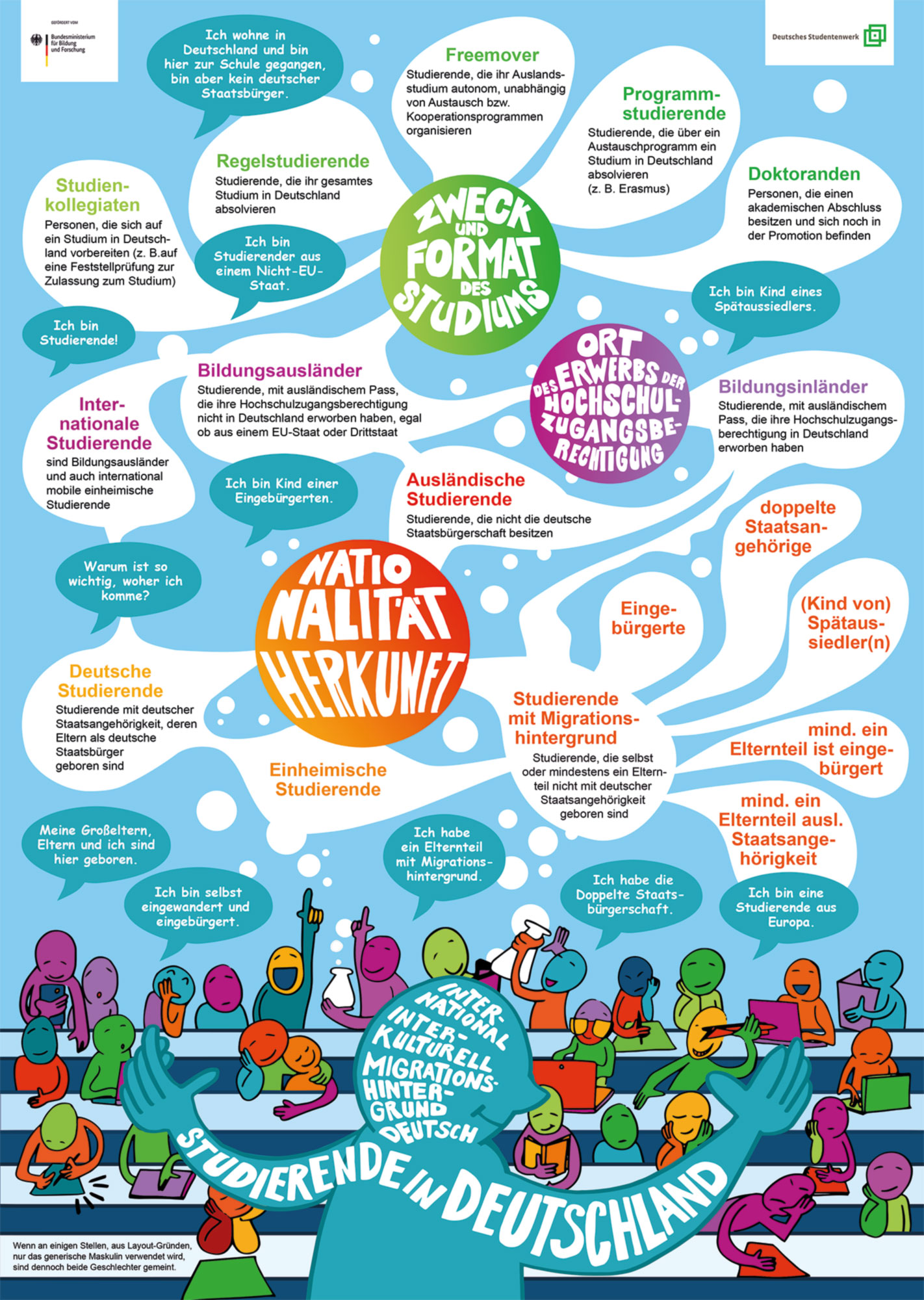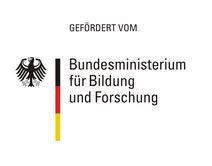The SIK communicates
The Service Point for Intercultural Competence (SIK) supports and presents the intercultural work of the Studierendenwerke (Student services organisations) with regular publications.
The Service Point for Intercultural Competence (SIK) makes the following publications available to the Studierendenwerke and higher education institutions:
Newsletter
The newsletter of the SIK reports on developments concerning the internationalisation of Germany as a higher education location. It provides practice-based contributions for the integration of international students, reports on current studies and gives tips for further reading. You can find the current newsletter in the download area at the bottom of this page.
Flyer "Job regulations for international students in Germany"
A part-time job offers international students in Germany the opportunity to gain experience, get to know Germany, make contacts and supplement the financing of their studies. The flyer "Jobben für internationale Studierende" ("Job regulations for international students in Germany") from the Service Point for Intercultural Competence presents residence, social and employment law regulations clearly and in simple language and thus provides an overview of the most important topics that international students should inform themselves about before taking up a part-time job in Germany.
The publication is aimed at institutions that support international students and is intended to promote their support services, e.g. advice and information for international students.
The flyer is available for download as an accessible PDF version in German and English. The print version can be ordered free of charge in both languages.
How-to video “Tips for international students: how do I finance my studies in Germany?
The how-to video from the Service Point for Intercultural Competence (SIK) explains the requirements and options open to international students for funding their studies, explains legal restrictions in the area of jobs and provides practical tips for planning your higher education studies in Germany.
In this way, students and study course applicants can get an initial overview of the topic of student financing before their stay in Germany and be aware of the most important contact persons and points of contact.
The video has a German and English soundtrack as well as subtitles. This means that important terms and the names of counselling and advisory services are also visibly in writing for the students to refer to.
With grateful thanks to Initiative Wissenschaft Hannover and the Studentenwerk Hannover, whose video clip the how-to video is based on, and the BMBF for funding this project.
Residency and social security law for international students – Guidance for student advisers
How can third-country nationals receive a residence permit to undertake higher education studies in Germany? What are their most important legal entitlements, if they do casual jobs in Germany? With a new specialist publication from its Service Point for Intercultural Competence (SIK), Deutsches Studierendenwerk (DSW) supports advisers and counsellors from higher education institutions and Studierendenwerke who work with international students.
The author of the 140-page publication is Prof. Dr Dorothee Frings, an expert in migration and social security law; she held a professorship in constitutional, administrative and social security law for social work at the Niederrhein University of Applied Sciences until 2017.
The information is divided into four chapters and thematically related to the legal status of students without German citizenship. FAQs are provided throughout, making it possible to find the right information quickly in a consultation situation and if confronted with enquiries. The information is clearly explained using case studies, and coronavirus-related information is also included.
The German-language publication “Aufenthalts- und Sozialrecht für internationale Studierende – Handreichung für Beratende 2020” can be ordered free of charge from Deutsches Studierendenwerk.
The English translation entitled “Residency and social security law for international students - guidance for student advisers” can also be ordered free of charge
In an accompanying Glossary central terms from the publication and from residency and social security law are translated into English and explained in English.
You can find the PDF versions, order forms, the glossary and further attachments and news under the links below.
Illustrated Mensa Dictionary
In the Mensa Dictionary, three students are accompanied on their daily route through the Mensa (student restaurant).
Meals and drinks, the MensaCard, the list of ingredients and regional differences are explained – with illustrations and vocabulary in three languages (German, English and Chinese).
The dictionary is intended to help international students in particular find their way around the Mensa, and it also introduces the variety and quality of the food.
The Mensa Dictionary was designed by graphic artist Florian Geppert, who also illustrated the “Health Dictionary” and the “Residence Hall Dictionary”.
The publication can be ordered free of charge and is also available as an online version.
Illustrated Health Dictionary
From A for Apotheke to Z for Zuzahlung – the health dictionary provides
a general overview and information for international students in German and English.
It contains information about health insurance, going to the doctor and medical certificates, among other things. Facts and vocabulary are explained in dialogues, short texts and scenes on campus: Patient information leaflet, Überweisung (referral), vaccination pass.
The Health Dictionary was designed by graphic designer Florian Geppert, who also illustrated the “Illustrated Residence Hall Dictionaries”.
Illustrated Residence Hall Dictionary
What does “Gelber Sack” mean in English and how do you actually separate your waste? The Residence Hall Dictionary explains these and similar questions and peculiarities of living in German halls of residence to international students and is intended to help unravel misunderstandings in everyday life.
Illustrations and vocabulary in eight languages: From Abflusssieb (sink strainer) to Schadensmeldung (damage report); from Backofenleuchte (oven light) to Wäschetrocknerchip (tumble dryer chip). Eleven chapters are devoted to topics such as arrival, furnishing, rights and obligations as a flatmate, kitchen technology, saving energy and living together.
The useful vocabulary picture book was first published in Bielefeld in August 2010. Residents, administrators of residence halls and caretakers were all involved in the project. Deutsches Studierendenwerk launched a national version in 2011 as the book was so popular.
The dictionaries are available in four different editions in different languages. All can be ordered free of charge from Deutsches Studierendenwerk.
Online version (German-English-Chinese)
Online version (German-French-Spanish)
Online version (German-French-Arabic)
A Matter of perspective. Critical Incidents from the point of view of Studentenwerke and Higher Education institutions
Why doesn't the student shake my hand? Why don’t they show up on time for the appointment? These and similar questions often arise in everyday working life with international students. In the context of the increasing internationalisation of higher education institutions, general information about the countries of origin is often no longer sufficient to answer questions – intercultural competence plays a key role here.
This publication presents 30 critical incidents, intercultural case histories drawn from communication with international students by employees of Studierendenwerke and/or higher education institutions. 93 students or employees have commented on the authentic cases. Dr Gundula Gwenn Hiller defines and explains the topic in detail in her introduction. The two worksheets can be used in intercultural training courses.
The publication is available in German and English and can be ordered free-of-charge from Deutsches Studierendenwerk.
Online version (German) Order print version (German) Online version (English) Order print version (English)
Studentenwerke interkulturell
Ten classic concepts and ten special projects, some of which have won awards, show how Studierendenwerke promote encounters and provide support and advice, including on a peer-to-peer level. These “classics” and “highlights” are representative of the numerous activities of the 58 Studierendenwerke in the intercultural sphere.
The activities presented illustrate the contribution of the Studierendenwerke to a successful study visit to Germany. They specifically address problems faced by international students such as orientation, financing and contact, address the need for intercultural awareness in the higher education sector and actively involve international and German students. Good cooperation with universities, local authorities, student associations and other stakeholders is often an essential basis for this. Start-up funding from the DAAD programmes STIBET, PROFIS and PROFIN was indispensable for many of these projects.
Round table discussions for international students – a toolbox with practical tips and materials
The internationalisation of Germany as a location for higher education continues undiminished. The institutions that care for international students are faced with the challenge of how to successfully integrate them, as well as issues of student retention and needs-based support for international students. In order to successfully implement suitable measures for the target group on site, a regular meeting of the local stakeholders involved in the form of a round table discussion is a good idea.
This kind of round table discussion can promote the informal, trustful exchange of experiences and allow the stakeholders to evaluate the situation. It can be used for individual case consultation, bilateral networking, an improved flow of information and the acquisition of knowledge. It can therefore support structural changes or cause them to happen.
The publication of the Service Point for Intercultural Competence (SIK) of the DSW offers information on how to initiate or set-up a “round table for international students”. Fundamental material is provided rather like a toolbox that can be used according to individual needs. The guide deals with aspects that can be considered when organising a round table discussion: From considerations about the university location in advance and possible stakeholders involved to tips, tricks and sample templates.
International? Intercultural? Migration background? German? – SIK info graphic
The internationalisation and diversification of the student body in Germany has led to the emergence of various terms.
Frequently used statistical categories on students such as “international”, “foreign”, “migration background” emphasise certain perspectives and ignore others.
Categories can also contain differences in the context of a pair of opposites, e.g. “we” (Germans) and the “others”.
This infographic from the DSW’s Service Point for Intercultural Competence (SIK) is intended to explain the terminology used for certain student groups from the statistics, but also to make the complexity visible and thus call existing attributions into question.
The idea is thereby to stimulate discussion and at the same time serve as a work aid.
You can find the infographic as a PDF in the download area at the bottom of this page.
SIK Events
Intercultural competence is decisive when you are dealing with students and the employees who work in higher education. Therefore the Service Centre offers intercultural training courses and seminars for employees of the Studierendenwerke and higher education institutions.
Related topics
Residency and social security law for international students
Illustrated Residence Hall Dictionary
Poster of the illustrated dormitory dictionary
Postcards for the illustrated dormitory dictionary
Regional tutor programmes (residence hall assistants program). A handbook for student services
Round table: international students – a toolbox with practical tips and materials

